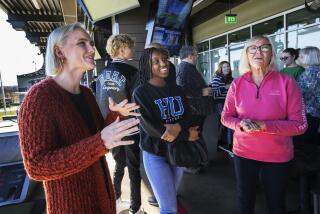Ex-KGB Aides to Join U.S. Talks on Terrorism : Meeting With Ex-CIA Experts to Begin Here on Boosting Cooperation in Sharing of Intelligence
- Share via
Two former ranking KGB officials arrived in Santa Monica on Sunday for talks designed to channel the growing superpower dialogue into specific areas of cooperation on international terrorism.
American and Soviet specialists on terrorism begin weeklong unofficial talks here today that will focus primarily on intelligence sharing, narcotics terrorism and hostage seizures.
“This is the first time that former officials of the KGB and CIA have met in a public policy forum,” said Igor Velayez, leader of the 10-member Soviet delegation. “This is a real opportunity for an exchange of views and the development of a new approach to international terrorism.”
There are already indications of a tentative opening on terrorism between the superpowers. U.S. intelligence officials have confirmed that Moscow was “helpful” after the murder of Lt. Col. William R. Higgins in Lebanon two months ago and the threat by Islamic Jihad (Islamic Holy War) to kill other American hostages.
The Soviet Union intervened on two fronts, according to Arab sources. Moscow warned Iran, which is widely believed to back the Lebanese extremist groups holding 14 Western hostages, that further hostage deaths might lead to U.S. military action in the Middle East.
Opposition to Hostage-Taking
It also made clear that the Soviet Union shares U.S. opposition to hostage-taking and that Moscow would “appreciate” Iran’s intervention in Lebanon. Soviet-Iranian relations have warmed considerably after Soviet Foreign Minister Eduard A. Shevardnadze’s visit to Tehran and new Iranian President Hashemi Rafsanjani’s meetings in Moscow this year.
Soviet diplomats in Syria and Lebanon also pressured Damascus and Muslim militias in Lebanon to use their influence on the Shiite fanatics to prevent another hostage death, the Arab official said.
The decision to allow two former ranking Soviet intelligence officials--Valentin Zvezdenkov, the KGB’s counterterrorism chief for eight years, and former Deputy KGB Director Fjodor Sherbak--to join Moscow’s delegation is seen as further evidence of Soviet interest in superpower cooperation and coordination.
“The way things are developing now, the terrorism Mafia is pooling its resources. It is time that world forces find a common language and a common way to prevent terrorism and protect all human beings,” Sherbak told The Times.
“The KGB and CIA each have their own specific responsibilities, but as far as prevention of terrorism, there is no question that active cooperation could begin in the near future.”
Coordination by Terrorists
Concern about disparate groups coordinating resources, such as the widely believed cooperation between Palestinian radicals and Iranian factions in the bomb destruction of a Pan American Airways flight over Scotland last December, has also been growing within U.S. intelligence circles.
The American delegation includes former CIA Director William E. Colby and former CIA Deputy Director Ray S. Cline.
The weeklong talks at the RAND Corp. in Santa Monica are a follow-up to sessions in Moscow in January that were credited with opening the way for the first official discussions of international terrorism at behind-the-scenes talks in Moscow in June. This time, however, both sides have added former intelligence officials.
Intelligence-sharing is considered the most sensitive area of potential new cooperation--in warning of impending attack, in follow-up investigations or in pooling data to prevent incidents.
Ranking CIA officials are known to be wary of sharing intelligence for fear of endangering or exposing sources and informants.
More to Read
Sign up for Essential California
The most important California stories and recommendations in your inbox every morning.
You may occasionally receive promotional content from the Los Angeles Times.













